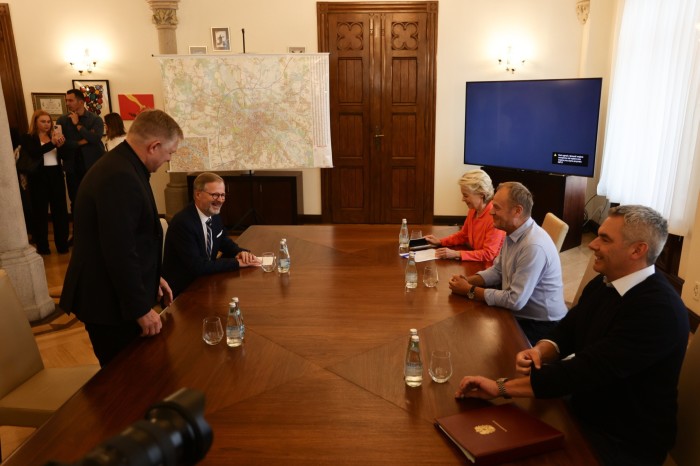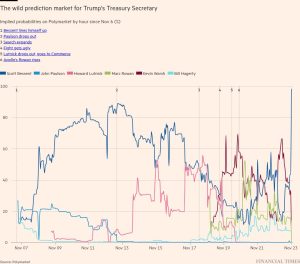Polish opposition digs in against Tusk’s ‘iron broom’

Polish Prime Minister Donald Tusk won elections last October with a pledge to use an “iron broom” that would sweep away political appointees installed by the previous Eurosceptic government.
But a year on, his success in delivering on that promise has proved limited.
Soon after taking office, Tusk mended ties with Brussels, unblocking Poland’s frozen EU funds and restoring his country’s international standing. Back home, however, Polish society remains deeply polarised and the premier’s agenda continues to face fierce resistance from senior officials loyal to the rightwing Law and Justice (PiS) opposition party.
“Tusk has made the dirt very visible but cleaning is much harder,” said Artur Nowak-Far, law professor at the Warsaw School of Economics. The premier “overpromised”, he said, noting that many in the Tusk camp expected a quick purge of those put in place by PiS. “But of course he has three more years to complete his agenda.”
Among the PiS loyalists scuppering Tusk’s initiatives are President Andrzej Duda who has legislative veto powers, the judges on the constitutional court and the central bank governor, Adam Glapiński.
PiS and its leader Jarosław Kaczyński, whose animosity against Tusk goes back decades, have continued to fuel the narrative that the premier is not a patriot and instead on a witch-hunt against PiS that serves the interests of Germany and Russia.
Despite several scandals and fraud investigations involving PiS politicians, the opposition retains its voter base, with one recent Ibris poll putting Tusk’s Civic Coalition on 32.9 per cent of voting intentions while PiS is on 32.1 per cent.
The conflict between Tusk and Duda is unlikely to abate before presidential elections in May, in which the incumbent can no longer run for another term. “I know, there are only 299 days left, but that’s 299 too many,” Tusk wrote on X this month, referring to the countdown to Duda’s departure.
Tusk’s performance has been anxiously monitored in other European capitals where his return to power was seen as a beacon of hope, countering the resurgence of far-right, ultranationalist parties which recently won elections in France, Germany, the Netherlands and Austria.
Brussels repaired ties with Warsaw shortly after Tusk became premier in December, closing a so-called article 7 procedure that can lead to the suspension of a country’s voting rights and unfreezing billions of EU funds that had been blocked in a rule of law dispute with the PiS government.
A former president of the European Council, Tusk belongs to the same political family as Ursula von der Leyen and earlier this year he helped her secure another term at the helm of the European Commission. After devastating floods last month that affected several countries, von der Leyen allocated half of a €10bn EU aid package to Poland.
“Tusk understands Brussels and Brussels likes what he represents, which we also see in how von der Leyen has tried to please him,” said Wojciech Gilewski, a former Polish diplomat.

Another boost will come in January, when Poland takes over the rotating EU presidency from the bloc’s disrupter-in-chief, Hungarian premier Viktor Orbán.
“Poland is already back as a real player in [EU] decision making, including the creation of the new European Commission, and that will become even clearer next year,” said Michał Szczerba, a member of the European parliament from Tusk’s party.
But Tusk has also had to accommodate his unwieldy coalition partners, to the disappointment of female voters who expected him to restore reproductive rights which had been severely restricted by PiS. The agrarian Polish People’s party, which is part of the ruling coalition, in July voted against a bill put forward by the government that would have decriminalised helping women terminate their pregnancies.
“I’m 200 per cent happy that PiS no longer controls Poland, but clearly below 50 per cent happy about what Tusk has done about my priorities — women’s rights and climate change,” said Marta Kowalska, a student who attended a summer gathering of Tusk supporters in Olsztyn.
Tusk however has succeeded in deflecting the blame for his coalition’s shortcomings, mainly on to parliamentary speaker Szymon Hołownia, a devout Catholic whose Poland 2050 party wants a referendum on abortion and has plummeted in recent polls.
This month Hołownia apologised during his party conference for not meeting voters’ expectations. He also acknowledged that “we didn’t listen enough to each other” within Tusk’s coalition.
In Brussels, the Tusk government maintained some of the policy goals set by the previous government, particularly when siding with angry farmers to vote against an EU nature restoration law. He also continued to impose import restrictions on Ukrainian agri-foods in order not to further alienate voters who have soured on support for Kyiv.
On Saturday, Tusk said that Poland would temporarily suspend the right to seek asylum for migrants crossing the border from Belarus after Moscow and Minsk facilitated their travel. He said that the uptick in border crossings was an attempt to destabilise Poland and an abuse of EU rules. “This right to asylum is used exactly against the essence of the right to asylum,” he said, adding that he will demand that Brussels backs his move.
“Tusk has been raising many of the same problems that we had put on the table in Brussels, but using a better narrative and less aggressive rhetoric,” said Konrad Szymański, who was Poland’s minister for EU affairs during the PiS government.
Tusk’s European agenda has also been affected by the more serious struggles of other leaders.
In March Tusk met French President Emmanuel Macron and German Chancellor Olaf Scholz to revive their three-way co-operation format called the Weimar Triangle. But after Macron and Scholz suffered crippling election setbacks, Polish officials started downplaying the alliance’s prospects.
Polish state secretary Władysław Bartodzewksi said this month that when “two parts of the triangle aren’t operating properly, it’s difficult to base the future on a present that doesn’t work”.
“There’s a limit to what Tusk can do without the right partners, both domestically and internationally,” said Michał Baranowski, who heads the Warsaw office of the German Marshall Fund think-tank. “Everything will remain work in progress until Duda leaves.”
#Polish #opposition #digs #Tusks #iron #broom





